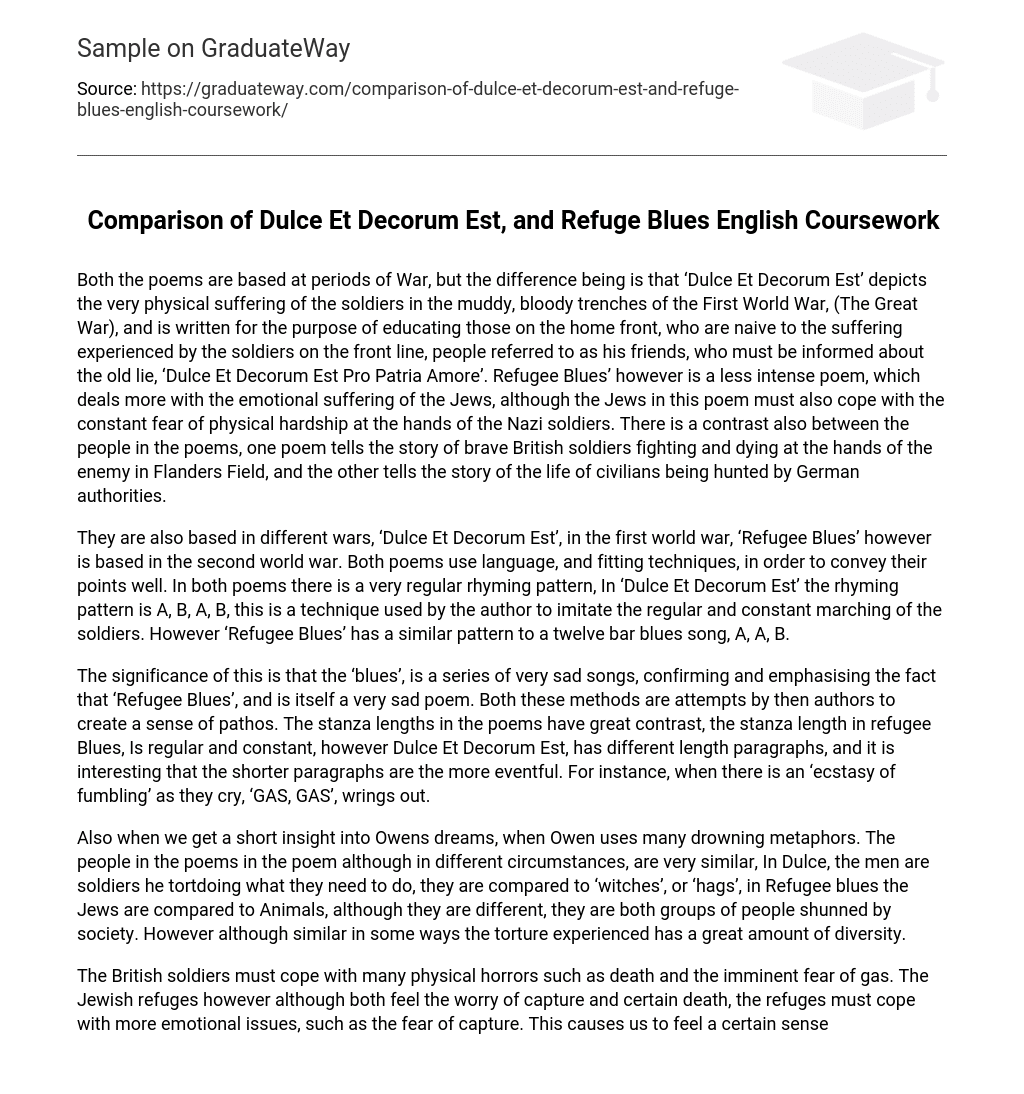Both the poems are based at periods of War, but the difference being is that ‘Dulce Et Decorum Est’ depicts the very physical suffering of the soldiers in the muddy, bloody trenches of the First World War, (The Great War), and is written for the purpose of educating those on the home front, who are naive to the suffering experienced by the soldiers on the front line, people referred to as his friends, who must be informed about the old lie, ‘Dulce Et Decorum Est Pro Patria Amore’. Refugee Blues’ however is a less intense poem, which deals more with the emotional suffering of the Jews, although the Jews in this poem must also cope with the constant fear of physical hardship at the hands of the Nazi soldiers. There is a contrast also between the people in the poems, one poem tells the story of brave British soldiers fighting and dying at the hands of the enemy in Flanders Field, and the other tells the story of the life of civilians being hunted by German authorities.
They are also based in different wars, ‘Dulce Et Decorum Est’, in the first world war, ‘Refugee Blues’ however is based in the second world war. Both poems use language, and fitting techniques, in order to convey their points well. In both poems there is a very regular rhyming pattern, In ‘Dulce Et Decorum Est’ the rhyming pattern is A, B, A, B, this is a technique used by the author to imitate the regular and constant marching of the soldiers. However ‘Refugee Blues’ has a similar pattern to a twelve bar blues song, A, A, B.
The significance of this is that the ‘blues’, is a series of very sad songs, confirming and emphasising the fact that ‘Refugee Blues’, and is itself a very sad poem. Both these methods are attempts by then authors to create a sense of pathos. The stanza lengths in the poems have great contrast, the stanza length in refugee Blues, Is regular and constant, however Dulce Et Decorum Est, has different length paragraphs, and it is interesting that the shorter paragraphs are the more eventful. For instance, when there is an ‘ecstasy of fumbling’ as they cry, ‘GAS, GAS’, wrings out.
Also when we get a short insight into Owens dreams, when Owen uses many drowning metaphors. The people in the poems in the poem although in different circumstances, are very similar, In Dulce, the men are soldiers he tortdoing what they need to do, they are compared to ‘witches’, or ‘hags’, in Refugee blues the Jews are compared to Animals, although they are different, they are both groups of people shunned by society. However although similar in some ways the torture experienced has a great amount of diversity.
The British soldiers must cope with many physical horrors such as death and the imminent fear of gas. The Jewish refuges however although both feel the worry of capture and certain death, the refuges must cope with more emotional issues, such as the fear of capture. This causes us to feel a certain sense of sympathy among the reader The main theme of both the poems are the overall suffering of the people, the poets uses Pathos, like the words ‘choking’ and ‘drowning’, to attempt to create sympathy.
In Dulce he refers to the soldiers as hags, this is very emphatic; it shows how the overall horror of the trenches has aged the men, the poem is a tribute to the brave men in the trenches. ‘Refugee blues’ has a similar thing but formed in a different way, Auden uses some comparisons to highlight the severity and unfairness of how the Jews are being treated, ‘some are living in mansions, others are living in holes, the two types of positions are juxtaposed to show the difference in the wealth.
Both Owen and Auden both stress the poor treatment the soldiers and Jews went through on a day-to-day basis. Auden highlights this with the phrase, ‘if you’ve got no passport you are already dead’ he uses the word dead to emphasise the importance of having documented evidence of living, ‘you are basically dead’. Owen creates more pathos in a different but just as effective way, he speaks about men ‘marching asleep’ and with no boots, it just shows the soldiers suffering, but on the other hand it also shows the soldiers commitment and determination to carry on and win the war.
But Owen attempts, in a way to blame all of these things on the generals. For instance when Owen refers to the General as ‘my friend’, he seems to be willing the general to stop lying to the younger generations, and whisking them of to war to die in a pointless battle. He also highlights the injuries on the men, this shows the commitment of the soldiers, that they are still willing to fight.
In both poems there is a strong and effective message at the end of each stanza, in Refugee Blues Auden attempts to make the end of every stanza into a conversation, between a man and his wife, he does this by making the man say his emphatic line, also the man after ever every stanza explains some of the feelings felt by him and his lover. I prefer ‘Dulce Et Decorum Est’, as a poem, because of the powerful language. But I feel that Refugee Blues is more relevant to myself therefore I find it more appealing to the situation I would be in as a civilian in a war, therefore I prefer ‘Refugee Blues’ as a poem.





